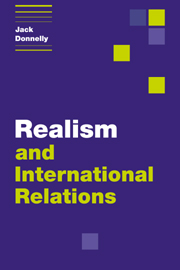Book contents
- Frontmatter
- Contents
- Acknowledgments
- Introduction
- 1 The realist tradition
- 2 Human nature and state motivation
- 3 Anarchy, hierarchy, and order
- 4 System, structure, and balance of power
- 5 Institutions and international society
- 6 Morality and foreign policy
- Conclusion: The nature and contribution of realism
- Selected recommended readings
- References
- Index
Introduction
Published online by Cambridge University Press: 04 December 2009
- Frontmatter
- Contents
- Acknowledgments
- Introduction
- 1 The realist tradition
- 2 Human nature and state motivation
- 3 Anarchy, hierarchy, and order
- 4 System, structure, and balance of power
- 5 Institutions and international society
- 6 Morality and foreign policy
- Conclusion: The nature and contribution of realism
- Selected recommended readings
- References
- Index
Summary
Realism and international relations
The tradition of political realism – realpolitik, power politics – has a long history that is typically traced back to the great Greek historian Thucydides in the fifth century BC. Although dominant attitudes towards realism have varied, realist arguments and orientations have been central to the Western theory and practice of international relations. In particular, “modern” international society, whether dated from the era of Machiavelli at the turn of the sixteenth century or that of Hobbes in the mid-seventeenth century, has been closely linked to realist balance of power politics.
The link between realism and international theory is especially strong in the twentieth century. International relations first emerged as an academic discipline before and immediately after World War I, largely in reaction against realist balance of power politics. The discipline was then reshaped immediately before and after World War II by self-identified realists such as E. H. Carr and Hans Morgenthau. Prominent scholar-practitioners, such as George Kennan and Henry Kissinger, have called themselves realists. For most of the post-World War II era realism has been the dominant paradigm in the Anglo-American study of international relations. Even in our post-Cold War era of globalization, realist theories, although much less dominant, still provide a context and motivation for many of the most important theoretical debates in the field.
This book presents a sympathetic but fundamentally critical assessment of the character of realism and its contribution to the study and practice of international relations. My approach is critical yet engaged. I approach realism largely on its own terms yet challenge many of its characteristic arguments and conclusions.
- Type
- Chapter
- Information
- Realism and International Relations , pp. 1 - 5Publisher: Cambridge University PressPrint publication year: 2000
- 1
- Cited by



